#kingston penitentiary
Photo
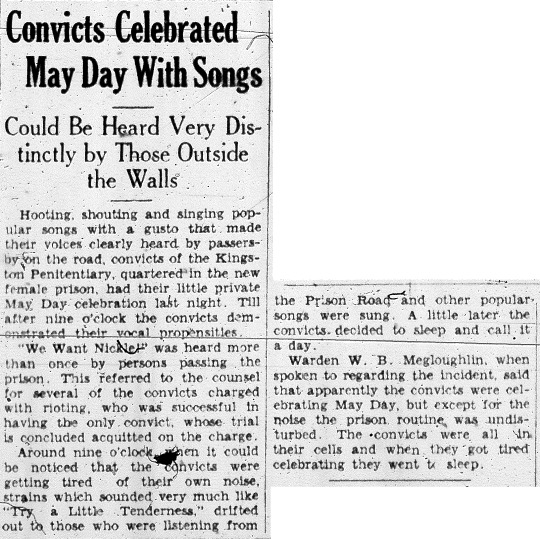
“Convicts Celebrated May Day With Songs,” Kingston Whig-Standard. May 2, 1933. Page 3.
----
Could Be Heard Very Distinctly by Those Outside the Walls
----
Hooting, shouting and singing popular songs with a gusto that made their voices clearly heard by passersby on the road, convicts of the Kingston Penitentiary, quartered in the new female prison, had their little private May Day celebration last night. Till after nine o'clock the convicts demonstrated their vocal propensities.
"We Want Nickle!” was heard more than once by persons passing the prison. This referred to the counsel for several of the convicts charged with rioting, who was successful in having the only convict, whose trial is concluded, acquitted on the charge.
Around nine o'clock when it could be noticed that the convicts were getting tired of their own noise, strains which sounded very much like "Try A Little Tenderness" drifted out to those who were listening from the Prison Road and other popular songs were sung. A little later the convicts decided to sleep and called it a day.
Warden W. B. Megloughlin, when spoken to regarding the incident, said that apparently the convicts were celebrating May Day, but except for the noise the prison routine, was undisturbed. The convicts were all in their cells and when they got tired celebrating they went to sleep.
#kingston ontario#kingston penitentiary#prison for women#may day#try a little tenderness#song in prison#prisoner protest#prison song#convict revolt#1933 prisoner trials#1932 kp riot#great depression in canada#red flag#crime and punishment in canada#history of crime and punishment in canada
28 notes
·
View notes
Text
i think making music is the most fun when you keep it to yourself. it’s like my own little secret. a little song that only i have heard and ever will hear. it’s nice
1 note
·
View note
Text
Here Is A Guide To Visit Kingston | Jamaica
Here Is A Guide To Visit Kingston | Jamaica
GET TO KNOW THE CITY
Kingston is the capital and biggest city in Jamaica. It faces the Palisadoes, which is a natural harbor situated on the southeastern coast of Jamaica. In addition, the governments of the parishes of St. Andrew and Kingston were amalgamated under the Kingston and St. Andrew Corp Act of 1923. This corporation then became known as the Kingston and St. Andrew Corporate…

View On WordPress
#canada travel#kingston#kingston attractions#kingston canada#kingston downtown#kingston jamaica#kingston ontario#kingston ontario canada#kingston penitentiary#kingston tour#kingston tourism#kingston town#kingston travel#kingston travel guide#ontario travel#places to visit in kingston#things to do in kingston#things to do in kingston ontario#travel#travel kingston#travel to kingston#travel vlog#visit kingston
0 notes
Text
A Little Catch Up on My Life and Travels
My last post was about selling our beloved place in Mexico. I haven't posted since then, but I've been busy, both with closing down the business, and then taking to the road.
I'm writing this from a hotel room in San Antonio, Texas. We have just finished a 5 day vacation with family, and my husband and his brother attended 3 days of the Formula One in Austin. They are very close to each other, and I think they enjoyed everything about their 3 days together. My sister in law and I are also close, and we enjoyed hanging out: there was a day of walking and checking out the River Walk, and a couple of days of relaxing and reading, (things we both enjoy).





Today we parted ways, with my BIL and SIL returning home and Craig and I staying one more night then flying onward to Mexico to meet up with my dad and a friend. We are headed to the town where we have spent 16 happy years, but this time we're not staying at our own place. Instead we are staying with our former property manager who also has rental apartments. While we will be doing many fun things with our local friends, we will NO be painting or fixing things, (a staple of our previous trips). It will be a different trip for sure.
However, I started my travels the last week of August, when my sister invited me to accompany her and my niece back to Ontario, (where my niece attends university). While I've passed through Toronto, both just within the airport, and by vehicle, I've never actually spent any time there, so I jumped at the opportunity. It was a fun and busy 5 days, sightseeing, catching a Blue Jays baseball game, and touring the infamous Kingston penitentiary, as well as getting my niece settled into her new house.






In between the two above trips, we took our travel trailer down the Washington and Oregon coasts, before cutting into more central California to Yosemite National parks. We stayed at both National Parks and State Parks, and boy to do I have a lot to say about those...however, that will be in another post. We had two nights in the San Francisco Bay area, staying in fabulous new regional park in the East Bay, where we spend an unexpected $900+USD when the water pump, followed by the serpentine belt gave out in our truck! Fortunately, we were in a big centre with lots of access to mechanics and parts!
We picked up friends who arrived from Scotland and together the 4 of us made our way back to Canada, via wine tastings and microbreweries!


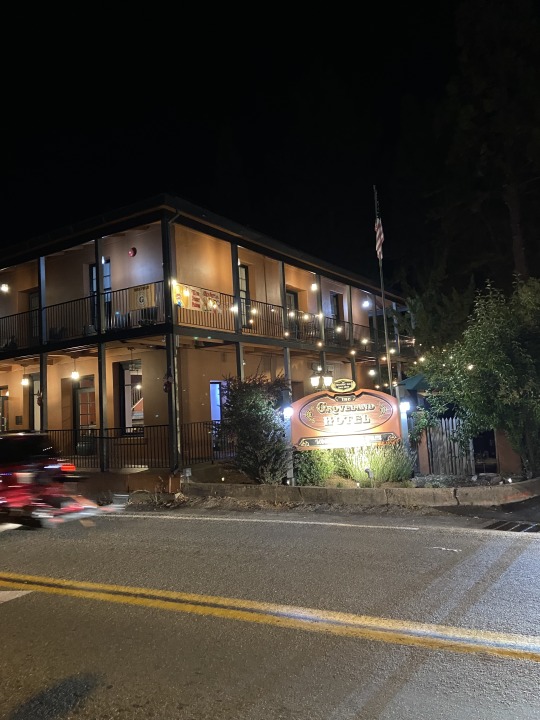







We loved catching up with family en route, and it was fun to play tour guide to our Scottish friends! We took them out to my favourite place in the world, (the west coast of Vancouver Island), as well as visiting the famous Butchart Gardens, (in the POURING rain), finishing with 2 nights in Vancouver.
So...I've definitely not been lollygagging or wallowing in sorrow over the sale of our place, although when I see it tomorrow evening for the first time since the sale, I may have a wee wallow. Until next time...



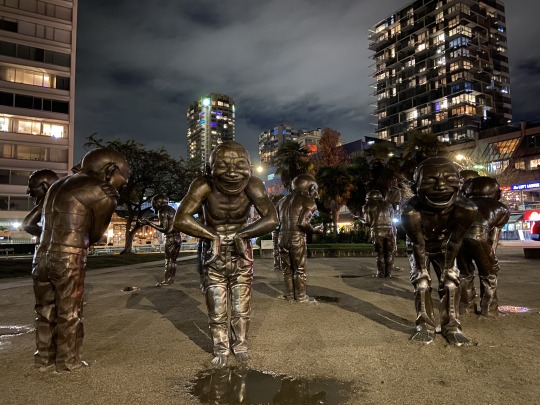

2 notes
·
View notes
Text
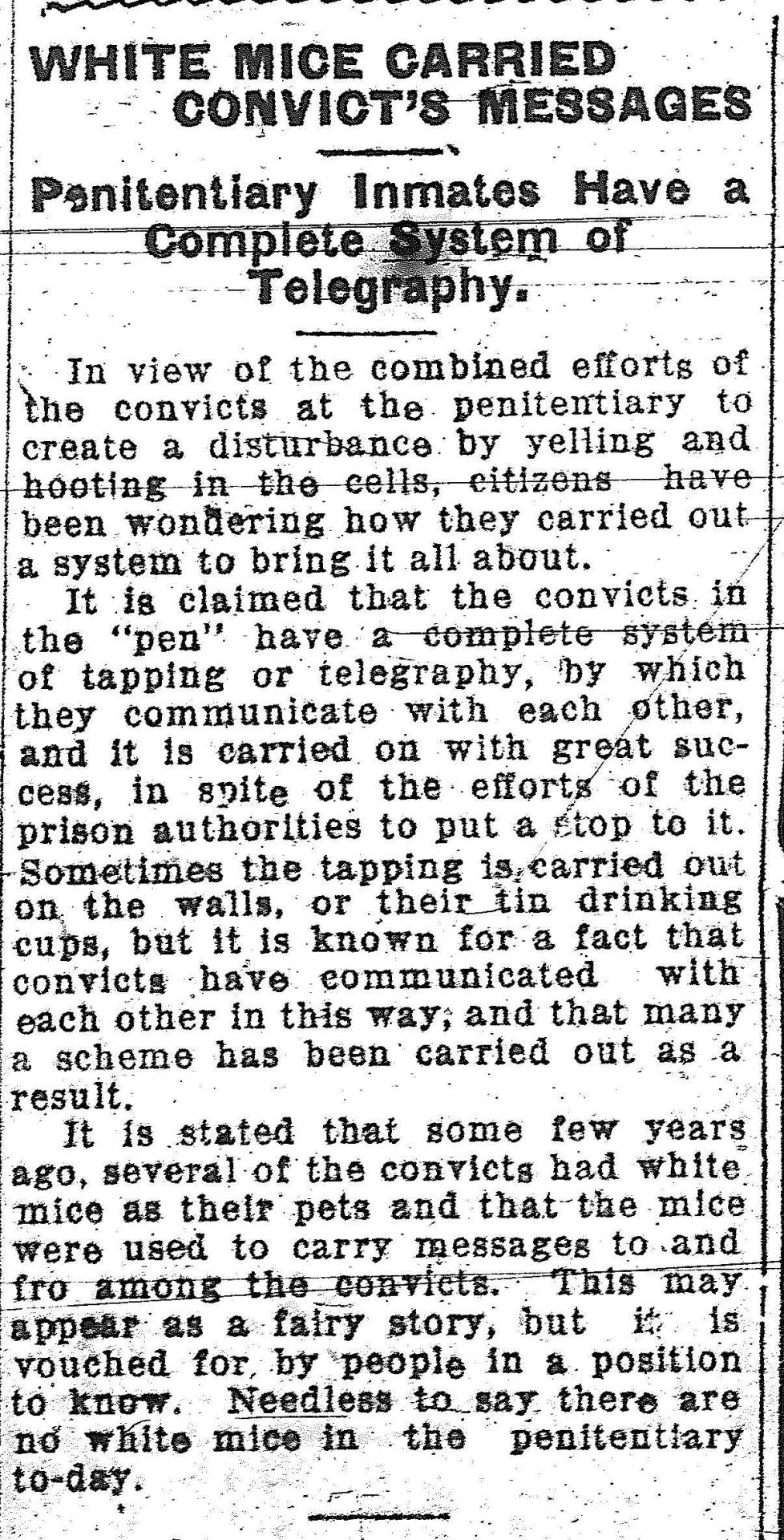
"WHITE MICE CARRIED CONVICT'S MESSAGES," Daily British Whig (Kingston, Ontario). October 21, 1920. Page 2.
---
Penitentiary Inmates Have a Complete System of Telegraphy.
----
In view of the combined efforts of the convicts at the penitentiary to create a disturbance by yelling and hooting in the cells, citizens have been wondering how they carried out a system to bring it all about.
It is claimed that the convicts in the "pen" have a complete system of tapping or telegraphy, by which they communicate with each other, and it is carried on with great success, in spite of the efforts of the prison authorities to put a stop to it. Sometimes the tapping is carried out on the walls, or their tin drinking cups, but it is known for a fact that convicts have communicated with each other in this way, and that many a scheme has been carried out as a result.
It is stated that some few years ago, several of the convicts had white mice as their pets and that the mice were used to carry messages to and fro among the convicts. This may appear as a fairy story, but it is vouched for, by people in a position to know. Needless to say there are no white mice in the penitentiary to-day.
#kingston penitentiary#kingston ontario#prison strike#prisoner protest#prison agitator#trafficking in prison#smuggling contraband#smuggling letters#causes of prison riots#1920 kp rcmp investigation#crime and punishment in canada#history of crime and punishment in canada#prison grapevine
5 notes
·
View notes
Text

"GETS TWO YEARS FOR 32 CENT ROBBERY," Windsor Record. December 22, 1913. Page 1.
----
Negro Sentenced to Kingston for Holding up Stranger - Accomplice Freed.
----
Convicted of holding up and robbing James Lamb, whom he volunteered to show to a rooming house, Wallace Watson, a Negro, was sentenced to two years in Kingston penitentiary at hard labor. The case was heard by Judge J. O. Dromgole at a sitting of criminal court held at Sandwich, Saturday. James Lockman, who was convicted of being an accomplice of Watson's was allowed to go on suspended sentence, the court holding that Lockman was held in to the holdup by Watson.
According to Lamb, he met the men at the Walker house where they had a few drinks. Later on he inquired where he could find a rooming house and Watson said he would show him. When an old shed was reached in the rear of a wood yard, Lamb claims the men held him up and took all his money, which amounted to 32 cents. Watson has served time before for different offences and the court decided to give him a stiff sentence as a warning to others who might be inclined in the same channels.
[Watson was all of 19, born in Windsor, a 'common labourer' and he had already served a term in the Central Prison in Toronto. He was convict #F-703 at Kingston Penitentiary and worked in the quarry and stone cutters. He was reported twice, once in December 1914 and again in May 1915, for talking and inappropriate language, and lost 15 days remission. He was released in late fall 1915. His sentencing occasioned a mini-newspaper scandal when the Kingston Daily British Whig, repeating a Toronto press story and reporting on his arrival to the penitentiary, noted he had received 2 years whereas a man found guilty of a sexual assault against a minor was only fined. The Whig, remarkably, was insinuating a racial bias as well as 'illogical' hierarchy of sentencing. This forced the Windsor Record to defend this disparity in sentencing, pointing to technical differences and criminal records.]
#windsor#rooming house#police court#hold up man#hold up#armed robbery#robbing drunks#sentenced to the penitentiary#kingston penitentiary#black canadians#jailbird#crime and punishment in canada#history of crime and punishment in canada
2 notes
·
View notes
Text
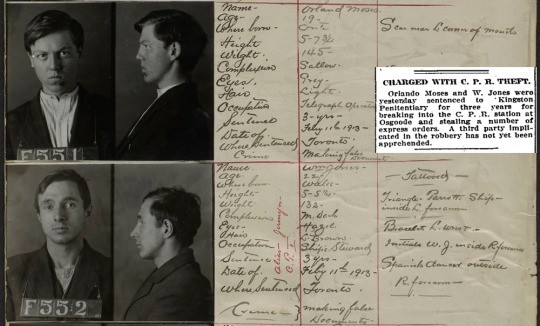
"CHARGED WITH C. P. R. THEFT." Toronto Globe. February 12, 1913. Page 9.
----
Orlando Moses and W. Jones were sentenced to Kingston Penitentiary for three years for breaking into the C. P..R. station at Osgoode and stealing a number of express orders. A third party implicated in the robbery has not yet been apprehended.
[AL: Moses and Jones escaped to Vancouver then Seattle, and were arrested in the States and brought back to Toronto - read more about their story here. Moses, top, was 19, and a telegraph operator with the Dominion Express Company who used his status to break into the train station and make off with blank money orders. Jones was 22 and older, a ship steward, and had previously been in the Central Prison. He was also known as Younger. As a sailor, he had many tattoos, including a parrot and ship on his left forearm, a bracelet on his left wrist, his initials on his right forearm, and a Spanish dancer on his right arm. Moses was convict #F-551 and worked in an outside construction and maintenance crew. Jones worked in an industrial shop inside the walls and was convict #F-552. Moses was reported for trading library books and lost his privileges for several weeks in July 1913. He was also reported in February 1914 and lost five days remission. He was paroled in mid-1914. Jones was reported once for impertinent language to a guard and went to solitary for seven days in July 1913. He was released in late 1915.]
#toronto#dominion express company#stolen books#theft#moses and jones case#crime and punishment in canada#history of crime and punishment in canada#stealing from the company#inside job#forging cheques#sentenced to the penitentiary#kingston penitentiary
2 notes
·
View notes
Photo
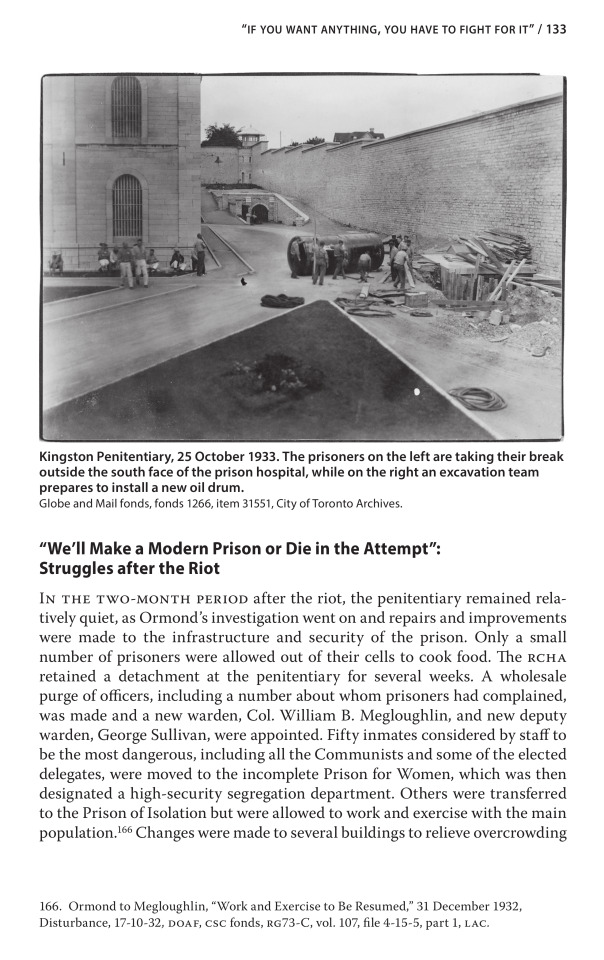
I don’t particularly like self-promotion or talking about myself, but with the 90th anniversary of this event coming up, I should really post about this. I am nervous/excited to announce my article, “If You Want Anything, You Have To Fight For It: Prisoner Strikes at Kingston Penitentiary, 1932-1935″ was published in the Canadian history journal Labour / Le Travail earlier this year.
Link: https://www.lltjournal.ca/index.php/llt/article/view/6150.
If anyone reading this wants a PDF copy, I can arrange that - please send me an ask! By May 2023 it will no longer be paywalled and will be free to read for everyone and anyone.
The article is about the strikes and riot that took place at Kingston Penitentiary, in Kingston, Ontario, Canada, between October 17-20, 1932. I was lucky enough to be able to consult sources that have never been used before, including thousands of pages of interviews, manifestos, letters, and petitions written by those incarcerated at Kingston Penitentiary.
The article focuses on:
- the conditions and organization of the Kingston penitentiary in the early 1930s
- how prisoners organized the strike, by writing manifestos and debating tactics in the workshops and cellblocks of the penitentiary
- the ideology and demands of the revolts, including the prisoner’s focus on ending corporal punishment, ending what they called “slavery” (forced labour), resisting the arbitrary “despotism” of guards and the warden, and creating an inmate committee to run the prison
- the prisoner struggles that took place in the years after the riot to enforce the demands made in October 1932
I also tried, and hopefully succeeded, in placing this prison riot as part of the broader upsurge of protest by the unemployed, impoverished and marginalized in 1930s Canada (instead of treating it in isolation, as often happens with studies of prisoner rebellion). I’ve been researching this topic for a long time so it's nice to see something finally coming together. I hope you find it interesting. Share, if you wish!
#kingston penitentiary#prison riot#prison strike#riot#prisoner resistance#canadian history#canadian politics#academic research#academic writing#convict revolt#causes of prison riots#1932 kp riot#prison riots#penal reform#great depression in canada#history of crime and punishment in canada#crime and punishment in canada
45 notes
·
View notes
Text

"MANY REFORMS NEEDED AT THE PENITENTIARIES," Toronto Star. December 19, 1913. Page 25.
----
Commission Will Probably Make Many Radical Recommendations.
----
Special to The Star.
Kingston, Ont., Dec. 19. - The minor charges against officers of Portsmouth penitentiary have taken up far more of the time of the prison reform commission than was expected, and as a result it will be necessary to hold a January session and perhaps even further sittings.
Charges against Deputy Warden O'Leary of favoritism, persecution, and graft are clearly not proven. Likewise petty charges against Surgeon Dr. Daniel Phelan have not been substantiated. Against the latter stands the unsatisfactory condition of the prison hospital and the insane ward, as brought out by Dr. E. H. Young, assistant superintendent of Rockwood Hospital. Dr. Phelan agrees that conditions in these departments are anything but satisfactory, but he places blame upon the inspectors and the Justice Department, holding that prison officials are not required to ask for reforms.
That guards have broken rules by trafficking in tobacco, that some of them committed perjury by giving wrong ages to secure positions in the prison, and that one at least was drunk while on night duty has been proven. On the whole the prison has a pretty good staff considering the wages paid. Guards have had long hours and unpleasant work and many times have complained when the staff was short and they were worked long over the regular hours.
It has been shown that the food is good but that it might be served in a somewhat better way. There is no evidence to show that unnatural offences have been committed by prisoners, although a number of convicts testified that such offences were common.
It is presumed that the commission will recommend that there should be a classification of prisoners so as to keep real criminals cooped by themselves. It will also recommend that youths be placed by themselves. A modern insane prison will also be one of the recommendations. The commission is also of the opinion that the time long ago arrived for the constant attendance of a resident physician at penitentiary. Years ago a city doctor did that work and also his own practice. Until two years ago Dr. Phelan, the man who is under censure, was paid only $1,800 a year and not allowed to practice.
#kingston penitentiary#royal commission#1913 kp royal commission#dysfunctions of the penitentiary#daniel phelan#prison doctor#crime and punishment in canada#history of crime and punishment in canada#kingston ontario#tobacco trafficking#trafficking in prison#corrupt officials#prison guards#the prison as asylum#partisan politics#deputy warden#daniel o'leary#classification and segregation#young convicts#penal reform
1 note
·
View note
Text
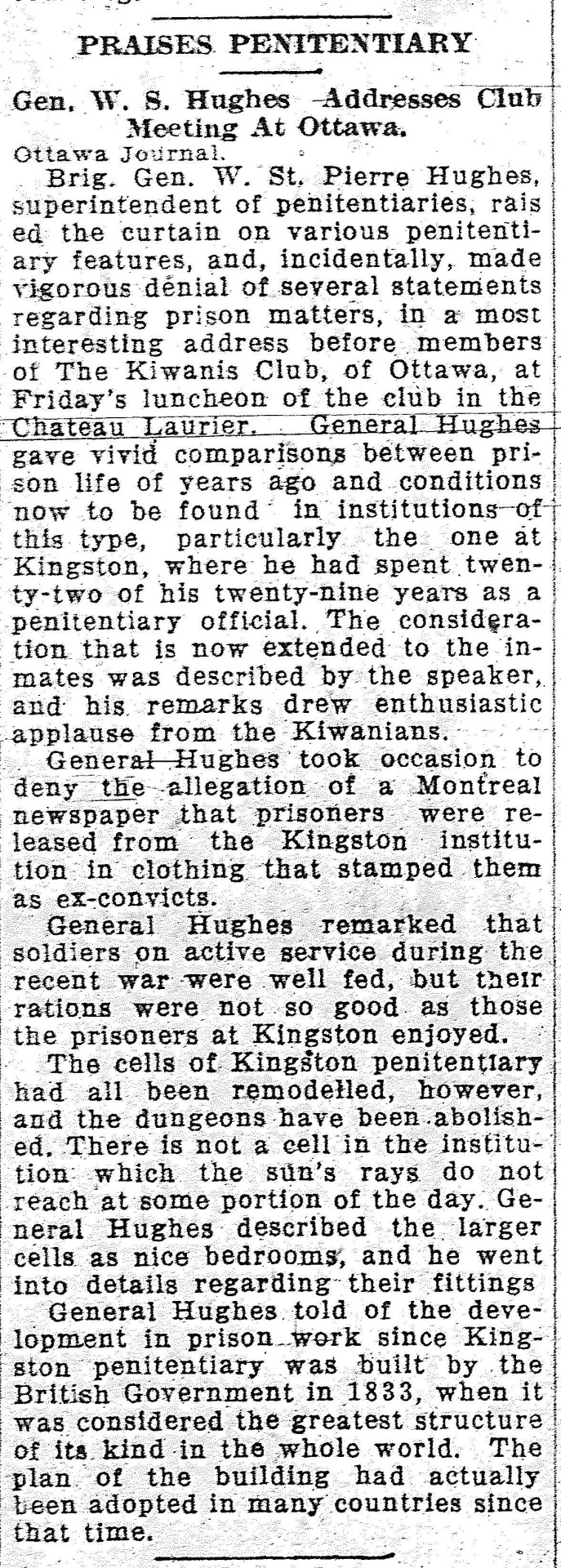
"PRAISES PENITENTIARY," Daily British Whig (Kingston, Ontario). September 20, 1920. Page 2.
---
Gen. W. S. Hughes Addresses Club Meeting At Ottawa.
----
Ottawa Journal.
Brig. Gen. W. St. Pierre Hughes, superintendent of penitentiaries, raised the curtain on various penitentiary features, and, incidentally, made vigorous dénial of several statements regarding prison matters, in a most interesting address before members of The Kiwanis Club, of Ottawa, at Friday's luncheon of the club in the Chateau Laurier. General Hughes gave vivid comparisons between prison life of years ago and conditions now to be found in institutions of this type, particularly the one at Kingston, where he had spent twenty-two of his twenty-nine years as a penitentiary official. The consideration that is now extended to the in- mates was described by the speaker, and his remarks drew enthusiastic applause from the Kiwanians.
General Hughes took occasion to deny the allegation of a Montreal newspaper that prisoners were released from the Kingston institution in clothing that stamped them as ex-convicts.
General Hughes remarked that soldiers on active service during the recent war were well fed, but their rations were not so good as those the prisoners at Kingston enjoyed. The cells of Kingston penitentiary had all been remodelled, however, and the dungeons have been abolished. There is not a cell in the institution which the sun's rays do not reach at some portion of the day. General Hughes described the larger cells as nice bedrooms, and he went into details regarding their fittings
General Hughes told of the development in prison work since Kingston penitentiary was built by the British Government in 1833, when it was considered the greatest structure of its kind in the whole world. The plan of the building had actually been adopted in many countries since that time.
#ottawa#kingston ontario#kingston penitentiary#kiwanis#chateau laurier#superintendent of penitentiaries#w. s. hughes#penal reform#prison administration#1920 kp rcmp investigation#crime and punishment in canada#history of crime and punishment in canada#dominion penitentiaries
1 note
·
View note
Text

"7 YEAR SENTENCE FOR BADALINI THE BLACKHAND MAN," Sault Star. January 29, 1913. Page 1.
---
Sent A. Greco Threatening Letter Demanding Money on Pain of Death.
---
WAS WELL CONNECTED AT HOME IN ITALY
---
Copy of Letter Given Below Offence a Serious One.
---
ATTEMPTED SUICIDE.
Badalini, with a seven-year sentence hanging over him, attempted suicide in the jail this afternoon, endeavoring to sever the arteries of his left wrist with a a piece of looking glass. His injuries are not considered serious.
Baldo Badalini, who sent a threatening letter to Alphonso Greco, demanding money was sentenced to seven year's in penitentiary by Magistrate Elliot this morning. The letter demanded money "not less than $20 and not more than $50" to be placed in a specified place along with the letter or things would be made hot for the family, the killing to start with the dog and end up with Greco and his mother. Crown Attorney McFadden was in charge of the case.
Mr. Uriah McFadden, solicitor for the defendant, put in an eloquent plea for him, pointing out that he was well connected in Italy, his father being an advocate and his mother a school mistress. But the magistrate saw the offence as serious one, and one that had caused much apprehension among he members of the Italian colony, and thought that a stiff sentence was the proper thing.
The following in a copy of the letter that Greco received:
Dear Greco: The Black Hand is implacable.
I beg you to bring tomorrow a sum, not less than 820 and not more than $50, behind the house of Geanetti Geovanni (enclosed in an envelope.) You must put i it behind the seat of the sleigh, which which will be near to Baccassanojs.
Besides this, you must put this letter with the money. I beg you not to mention a word about this to anyone, or else it will go bad with you and your family. With this money we shall have to pay the court of Toronto for the liberation of one of our friends from prison. If you will do what we ask ask, you may rest assured you will lead a tranquil life, but if not harm will come. Two stick's of dynamite and six bullets will be directed towards you, unless you do exactly what we want you to do.
Be careful to do what we ask you for the first and last time.
And remember that our hand is strong and and long. Then you will live peacefully all your life, and whenever it may be in our power to help you we will not fail you.
Thanking you in advance, we wish you to put this letter with the money. If you want to live peacefully, do as you are told, and if you want to shed blood, we will begin with your dog, and finish with you and your father. If you say a word to anyone you are all lost.
Our hand is long and powerful.
[AL: Badalini was 20, from Italy, a carpenter, and had no previous criminal record. He was convict #F-546 at Kingston Penitentiary, and he worked mostly as a carpenter. He was only reported twice - once in June 1913, being put in solitary for 48 hours, and in July 1913 lost 3 days remission. He was deported in 1919.]
#sault ste. marie#black hand#terror by letter#attemped extortion#brotherhood of the black hand#turns out the black hand is a tactic not a group#sentenced to the penitentiary#kingston penitentiary#crime and punishment in canada#history of crime and punishment in canada#italian immigration to canada
1 note
·
View note
Text

"Convicted of bigamy in marrying Mrs. Frazer, of Highgate, while his previous wife was still living, Peter Schram was yesterday morning sentenced in Chatham by Judge Dowling to six years' imprisonment in Kingston penitentiary. Schram is alleged to have been thrice married."
- from the Hamilton Spectator. April 26, 1913. Page 4.
[AL: Schram was 52, from Simcoe, Ont., a stationary engineer, and had served a previous jail term for bigamy in the local jail. Schram was convict #F-599 at Kingston Penitentiary and worked in the engineer's gang. He was paroled in late 1914.]
#chatham#bigamy#bigamous marriage#small town ontario#rural crime#rural canada#regulation of marriage#marriage law#sentenced to the penitentiary#kingston penitentiary#crime and punishment in canada#history of crime and punishment in canada
1 note
·
View note
Text

"KEEPER GAVE WRONG AGE," Kingston Daily Standard. December 17, 1913. Page 1 & 7.
----
Attempt to Implicate Dr. Edwards in This Was Unsuccessful.
----
DEFENCE OF OFFICIALS
----
Deputy Warden on Stand - Admitted Conducting Two Hosings -Favors Tobacco For Convicts.
----
At this morning's session of the Penitentiary Commission Deputy Warden O'Leary was asked to explain why Guard Ingledew had been fined $5 for reporting the finding of a box containing needles in a convict's cell. He could give no explanation. The defence of the officials are now being heard.
An attempt was made to implicate Dr. Edwards, M.P., in connection with a charge which had been made in the application of a guard. The guard, however, would not implicate the doctor.
Dr. Edwards stoutly denied the insinuation.
KEEPER'S AGE GIVEN WRONG.
Keeper D. Godkin, the first witness, was asked concerning his age. At first he stated that he was over 35 years of age. He was asked if he was any older and he said a little.
"How old is your eldest son?"
"About 22 years."
"Dou you know that your age in the records differs from what you told us?"
"Yes. I said I was over 35 years. I am about 45 years old."
An application was produced and the witness was asked if this was his application. He said that it looked like it. He was asked if his age was mentioned in the application. The witness said that it was and that it was about 10 years out.
"Who altered that date from 1871 to 1878?"
"I guess I did. I didn't have to swear to it."
"Did anyone suggest that you change it?"
"No. Inspector Stewart said that the date was not distinct and changed it?"
TRIED TO IMPLICATE DR. EDWARDS.
The chairman pressed the witness in regard to this point, intimating that the change had been made at the instigation of Dr. Edwards. The witness, however, would not say that Dr. Edwards had anything whatever to do with it.
"I'm not going to swear a lie for any job in this institution," said the witness, when the chairman pressed him to be explicit.
DR. EDWARDS.
Dr. J. W. Edwards, asked placed in the box, and after being sworn explained the application of Keeper Godkin. "I frequently receive applications from people of the county for positions. I provide such persons with applications, telling them the required age and height, and then I forward the letter to the department with my recommendation. In the case of this man, the application was sent to the department, and later it was returned by the inspector, stating that the figures in the date of birth were indistinct. I sent the application back to the guard, explaining what the inspector had told me. In my letter to the guard I merely quoted the letter of the inspector."
The chairman: "And you didn't see the application again?"
"No. The guard sent it back to the inspector."
Mr. Downey: "With your experience in the appointment of guards, are you prepared to say anything as to the wisdom of the present method. What is the effect on the service of the institution ?"
"I can't see that it affects the service; if men are examined and are found sound."
"Doesn't political recommendation precede physical examination?"
"Yes. I see your point. It is defect if political pressure is so strong as to appoint a man."
"I want to say this, however, I know what the age requirement is, and I know what the height requirement is, and I have pointed this out to every applicant. I leave the rest to the applicant."
DEFENCE OF OFFICIALS.
The defence of the two officials was then commenced, Deputy Warden O'Leary be the first to be called.
Mr. Whiting: "How many prisoners are at the prison, and how many have reports against them?"
"There are about 500, about 35 per cent. have reports against them. Many of these are only admonished."
"How many of the convicts are real troublemakers ?"
"About 35 or 40."
Mr. Whiting asked about the hosing. The witness said that in his time hosing was only used once until Inspector Stewart was acting warden.
"How often was it used during his regime?"
FILE OR SIX HOSINGS.
"Perhaps five or six times."
"What were the characters of the men who were hosed?"
"They were incorrigibles."
Dr. Etherington: "Some were insane, Buckley for instance."
"No. He was not insane at that time."
"Did you inflict that punishment on your own authority ?"
"Yes, I did, once on Buckley, and once on another convict. I was acting warden at the time."
"Is there any regulations governing them?"
"Yes. It is sanctioned by the regulations governing punishment."
Mr. Whiting read from the prison regulations, showing that in 1898, the punishment was authorized by the governor-in-council.
AS TO FAVORITISM.
"In regard to the charge of favortism in connection with the roster, what do you say?"
"The men are appointed according to their ability. Sometimes a man has special qualifications for a certain post. Religion has never been considered for one moment."
Mr. Stewart objected, saying that Mr. Whiting, by his form of questions, was giving the evidence. Mr. Downey suggested that it would be better if Mr. Whiting would not "lead" the witness. Mr. Whiting agreed.
Mr. Whiting then produced a roster referred to by Inspector Hughes, in which the Inspector had charged favoritism in the selection of guards for certain posts. Roman Catholics were said to have been favored. The deputy stated that there was no favoritism shown.
Mr. Whiting asked an expression from the Commission on the charges of persecution. Mr. Stewart objected saying that he had no right to ask the commission to make a ruling.
Mr. Whiting retorted that in legal practice the counsel for the defence had a right to ask if a case hall been proved was closed. when the prosecution.
Mr. Downey stated that the Commission had no opportunity to look over the evidence and that it would be better to go over it.
TALE OF A MAT.
In regard to a mat which Inspector Hughes, in his evidence, stated that the deputy warden wouldn't let him have, the witness said that the order was given by the guard in charge of the man who was taking the mat to the Inspector, who was then accountant.
Mr. Whiting then asked about quantity of wood, which it had been stated, was taken by the deputy. The deputy produced a requisition and a receipt showing that he had paid for it.
In regard to the charge made by Guard Aikens that the deputy had said he had no use for Dr. Edwards when he was informed that Dr. Ed- wards was running for parliament, the deputy said he never made the remark. He had never taken any interest in politics since his appointment.
Referring to a guard named Bannister who accused the deputy of keeping him on a wharf in the middle of winter, until his feet frozen, the deputy stated that were the man was under the charge of the Trade Instructor, Mr. Burns.
THE PERJURY CHARGE.
Asked as to a charge made by Patterson that the deputy had perjured himself thirteen years ago, at an investigation into the disappearance of some gravel, the witness stated that he couldn't remember anything about it.
The deputy warden denied that be had ever made any statements to ex-convicts to the effect that would leave the prison in a a box. Evidence to this effect was given by two ex-convicts at last week's sessions.
In connection with the complaint made by a guard, Ross Davis, that he was refused a half holiday when others were granted them, the deputy stated that this was the result of an order issued by Inspector Stewart, the acting warden. The case of Guard Sullivan was mentioned. got off every Saturday afternoon to umpire baseball matches. These were taken off his regular holidays.
Mr. Downey - "I would feel safer inside these walls, than umpiring a baseball match."
The deputy also denied several other charges made against him. He said that he never took any part in politics.
CROSS-EXAMINATION.
Mr. Stewart then took up his cross-examination.
"What experience did you have in prison work before your appointment?"
"I was in the Dominion police for several years. I was inspector when I was appointed."
"When you came here Mr. Metcalfe was warden. What experience did he have?"
"I don't think he had any."
Mr. Stewart then asked about several wardens who followed Mr. Metcalfe. The deputy stated that none of them had any experience in prison work.
"And in consequence they had to rely on you for the administration of the prison, didn't they?"
"They always consulted me."
IMPORTANT POSITION.
Mr. Stewart - "Your position is the most important in the internal administration of the prison, and among your regulations is one which holds you responsible for the administration and discipline, and also requires you to make an investigation of all reports against convicts. You do that don't you?"
"I did until Warden Irvine came. He makes the investigations. I still make a report."
"You assign the convicts to their different places?"
"I do."
"How do you do it?"
"When a convict comes in I find out if he has a trade or not, and how long he serves."
"Well, how about the stone pile?"
"Well, when a man comes in without a trade, I look him over; if he is healthy and robust looking but not very bright. I put him on the pile."
"How many are there on the pile."
"About 100 is the largest number."
"Some say they have been on the pile for over 5 years?"
ON PILE FIVE YEARS.
"I guess they're right. There is no place else for them."
"Well then an incorrigible or troublesome convict would have greater opportunity to cause trouble there than anywhere else?"
"No, I don't think so. They are placed there because they were cripples, or not able to do any menial work."
"There have been a number of boys here who testified that they were on the pile for some time."
"Yes, because there was no other place for them."
"Well, isn't it a hard place?"
"Yes. It's degrading and monotonous. The convicts think its degrading."
The chairman: - "Are any convicts placed there for punishment?"
"No. If a man can't get along in his gang he is transferred to the stone pile."
"The stone pile is dangerous and unhealthy?"
"Yes. It is in a shed and it's very dusty."
CONDUCTED TWO HOSINGS.
In regard to the hosing the deputy admitted conducting two hosings. In one case, a convict threw slops over a guard as he passed his cell, and called him names. He was bored for three minutes. This was in May of this year. The man was transferred subsequently to the insane ward. Another convict was hosed in the same month for swearing at a guard, while he was fighting with another convict.
"Was there a medical certificate secured before this hosing?"
"Yes."
Dr. Etherington: "Were there any medical certificates in the case of men sent to the punishment cell?"
"No. Only in the case of corporal punishment."
"Do you know anything about the tubbing of convicts, with straps tying their hands, and feet?"
"No. I do not."
When did you first know of this " punishment?"
"Two or three years ago I saw a convict being taken out of a tub. His face was all dirt, and they said they were giving him a bath."
"But you would know of it, wouldn't you ?"
"I have heard of it going on."
Mr. Whiting: "What has this got to do with the case? Some guards know nothing about it."
Dr. Etherington: "The fact is that we have had testimony from guards and convicts of tubbing, and the order of the surgeon shows that tubbing has been going on."
"I have heard of men being strapped up to give them a bath when they refused to take one. But I never heard of it as a punishment."
AS TO INDECENCY.
"Did you ever hear of indecent offences being committed by the convicts?"
"I have heard it said that there were a good deal of indecency stone pile No. 2, but I know on it would be impossible for the men to commit these offences without being seen."
"You have a good deal of trouble. with tobacco ?"
"Yes,"
"You are aware that the guards are responsible ?"
"Yes. I have my suspicions. Six or seven years ago I was instrumental in having an investigation and having a number of guards discharged for this offence."
"You think that the convicts should be given tobacco?"
SHOULD GET PLUG A WEEK.
"Yes. I think that they should get a plug a week."
ESCAPE OF CHARTRAND.
In reference to the escape of the insane convict Chartrand, Mr. Stewart asked concerning a guard, who was in charge of the asylum, and who had a véry poor record.
The deputy was of the opinion that the guard was a capable officer, except for one weakness.
"The bars in the window in the corridor were cut. They could not have been cut at any other time than during the day time, when this guard was on duty?"
"No."
FINING OF GUARDS.
In regard to the firing of guards, which is the procedure ?"
"The warden recommends their fining to the Inspector on the recommendation of the deputy warden."
"I notice here that Guard Godkin has been fined several times, while Guard Walsh, against whom there have been several complaints, has not been fined."
"That is left to the discretion of the warden."
Mr. Stewart read a report which the deputy warden made to the Inspector recommending that Guard Ingledéw be fined $5, for reporting the finding of a small box containing needles, thread, etc., in the cell of a convict in the hospital. In his communication the deputy pointed out as another instance of the friction between the overseer and some of the guards.
SHACKLED TO CELLS.
In the evidence taken it was admitted by the deputy that convicts were shackled to the cells by their hands during working hours. The chairman stated that that form of punishment was seen by the commission in Stilwater, the model prison of the United States.
"The man is shackled to his cell until he promises to conform to orders," added the deputy.
When asked was there any "snitching" going on in the prison the deputy said not. "This is the spy system," said Dr. Etherington.
"Yes, but we don't have any such system here," said the deputy.
"Why was this man fined?"
"I was acting warden at the time."
Dr. Etherington asked if it was not a fact that the orderlies in the hospital were allowed many privileges, and that the box of needles had been left accessible to anyone passing.
The deputy stated that this was the case. The box had been in the corridor for several years.
Mr. Stewart pressed for an explanation of the fine imposed. The deputy couldn't reply.
"I suppose that the report made by Ingledew was only another instance of the friction which existed, and that the fine was levied on this account," stated Mr. Whiting as the commission adjourned.
The cross-examination of the deputy warden continued this afternoon.
#kingston penitentiary#royal commission#1913 kp royal commission#dysfunctions of the penitentiary#corporal punishment#hosing#solitary confinement#prison management#daniel o'leary#crime and punishment in canada#history of crime and punishment in canada#kingston ontario#deputy warden#dismissed guards#prison guards#partisan politics#corrupt officials
1 note
·
View note
Text

""VICK" GETS THREE YEARS PENITENTIARY," St. Catharines Standard. June 19, 1912. Page 1.
---
Sentence Was Light Because Prisoner Had Been Good Four Years -Waiter Staples Gets 3 Months for Theft
----
In police court this morning the man who called himself John Vick, but whose right name is James Quinn, was sentenced to three years in the penitentiary for house-breaking and stealing clothing from a trunk stored in an office on King street. He has been in jail for four weeks, and the police have been looking up his record.
The prisoner comes from Guelph, where he was sentenced in 1897 to an eight year term for arson; and in 1908 he was sent to Central prison from Galt for stealing a pair of shoes. The police tried to connect him with a burglary in Owen Sound but were unable to do so. He promised if he were let off this time he would be good forevermore. The magistrate, in consideration of not finding anything against the prisoner within the last four years, sentenced him more lightly then he otherwise would, and hoped at the end of the three-year sentence he would lead a better life.
Walter Staples was up on remand on charges of stealing a raincoat and a pair of rubber boots. The case had been continued to get the evidence of Charles Boyd for the defence, and Mr. McCarron appeared.
[AL: Quinn alias Vick was 36, a printer by training but in and out of odd jobs, and an ex-convict and frequenter of jails. He was convict #F-416 this time around. He worked in the print shop at the Kingston penitentiary. He was reported once in June 1912 and admonished, and again in May 1913, and put in solitary for 24 hours. He was released in March 1915.]
#st. catharines#guelph#police court#housebreaking#housebreaker#stolen clothes#ex-convict#jailbird#long criminal record#criminal aliases#sentenced to the penitentiary#kingston penitentiary#crime and punishment in canada#history of crime and punishment in canada
1 note
·
View note
Text
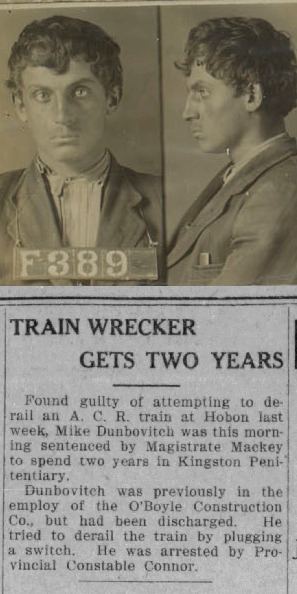
"TRAIN WRECKER GETS TWO YEARS," Sault Star. May 6, 1912. Page 1.
---
Found guilty of attempting to derail an A. C. R. train at Hobon last week, Mike Dunbovitch was this morning sentenced by Magistrate Mackey to spend two years in Kingston Penitentiary.
Dunbovitch was previously in the employ of the O'Boyle Construction Co., but had been discharged. He tried to derail the train by plugging a switch. He was arrested by Provincial Constable Connor.
[AL: Dunbovitch or Dunbodie was an 'Austrian' immigrant to Canada, 20 years old and unemployed; this was his first offence. He was actually convicted of breaking locks and stealing a railway handcar. He was convict #F-389 at Kingston Penitentiary and worked in the quarry and trucking gang. He was a very poorly behaved according to prison rules - he was 'admonished' (reported and lectured) five times between June and October. He was reported again in November and December and lost his 'good time.' He was put in solitary for 12 days in February 1913, and again in March and April. Finally, he was transferred in mid-April 1913 to the high security permanent segregation unit - the Prison of Isolation. A few days later he was given 7 days bread and water in his cell. He was kept in Isolation for the rest of the year, and released at the almost full extent of his sentence in April 1914.]
#sault ste. marie#attempted sabotage#train derailment#breaking and entering#break in#railway yard#construction workers#northern ontario#sentenced to the penitentiary#kingston penitentiary#crime and punishment in canada#history of crime and punishment in canada
1 note
·
View note
Text
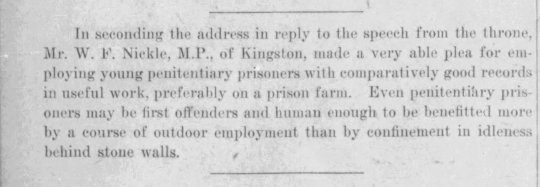
"In seconding the address in reply to the speech from the throne, Mr. W. F. Nickle, M.P., of Kingston, made a very able plea for employing young penitentiary prisoners with comparatively good records in useful work, preferably on a prison farm. Even penitentiary prisoners may be first offenders and human enough to be benefitted more by a course of outdoor employment than by confinement in idleness behind stone walls."
- from the Sault Star. December 4, 1912. Page 4.
#kingston ontario#member of parliament#parliamentary debate#parliament of canada#speech from the throne#borden government#canadian politics#w. f. nickle#penal reform#kingston penitentiary#first time offenders#prison farm
1 note
·
View note